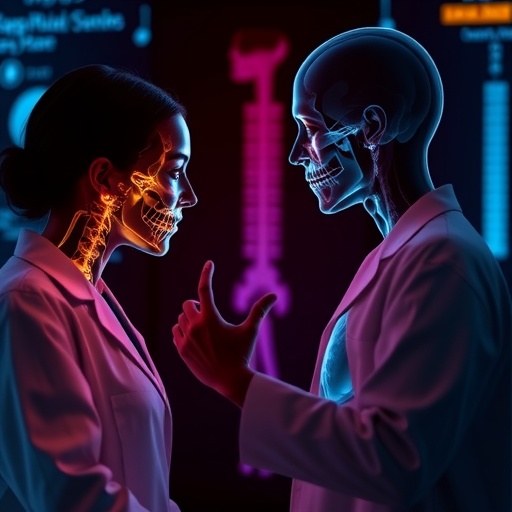In the era of rapid advancements in medical education, the landscape of training future healthcare professionals continually evolves. A pivotal publication by Khan et al. presents a groundbreaking model for assessing the competencies of radiology residents, harnessing the innovative framework of entrustable professional activities (EPAs). This comprehensive approach aims to bridge the gap between theoretical knowledge and practical application, cementing its significance in the field of medical education.
The research articulates a critical need for a structured assessment framework that aligns with the contemporary demands of medical training, particularly in radiology. Radiology is a complex specialty that requires high levels of expertise due to the intricate nature of diagnostic imaging and patient care. The introduction of EPAs provides a clear pathway for both educators and trainees to ensure that assessments effectively measure the readiness of residents to perform specific clinical tasks independently.
Central to the authors’ proposition is the realization that traditional assessment methods may not adequately prepare residents for the multifaceted challenges they will face in real-world clinical settings. By employing case-based scenarios, the framework outlines how residents can demonstrate their competencies across various domains, from technical skills to communication and decision-making. This shift towards a more integrated and practical approach is essential in fostering a new generation of radiologists who can thrive in high-stress environments.
Throughout the paper, Khan et al. highlight the importance of stakeholder engagement in the development of the EPA framework. Involvement from educators, practicing radiologists, and residents themselves is vital for creating a robust and relevant assessment tool. This collaborative effort ensures that the framework reflects the realities of clinical practice and takes into consideration the diverse experiences of those within the field.
One of the standout features of this framework is its adaptability. The authors suggest that the EPA model can be customized to suit different educational settings and institutional needs. This flexibility makes it an invaluable resource for training programs seeking to implement innovative assessment methodologies. Institutions with varying levels of resources and training capacities can tailor the framework to optimize educational outcomes and better prepare residents for independent practice.
Moreover, Khan et al. discuss the role of feedback in the learning process. The EPA framework encourages a continuous dialogue between residents and their supervisors, fostering a growth mindset and facilitating professional development. This iterative feedback process not only enhances the learning experience but also promotes accountability among residents as they transition into fully-fledged medical practitioners.
An intriguing aspect of this research is its focus on the future of radiology education. As technology continues to revolutionize the field—from artificial intelligence to advanced imaging modalities—the competencies required for practice will inevitably shift. The authors assert that a forward-thinking approach to assessment is essential to ensure that residents are equipped with the skills necessary to excel in a rapidly changing landscape.
The paper also addresses potential challenges in implementing the EPA framework. The transition from traditional assessment methods to a more modern approach may encounter resistance from both educators and residents accustomed to established practices. However, the authors believe that by demonstrating the efficacy and relevance of the new framework through pilot programs and evidence-based outcomes, these concerns can be alleviated.
In addition, the authors make a compelling case for the validity and reliability of the EPA framework. By aligning assessments with specific clinical tasks and responsibilities, the model offers a more nuanced view of a resident’s capabilities. This granularity not only enhances the evaluation process but also boasts the potential for enriched learning experiences that resonate with the realities of independent practice.
As the field of medical education navigates this transformative period, the findings of Khan et al. serve as a beacon for educators in radiology and other allied health fields. The proposed framework showcases a thoughtful integration of innovative assessment techniques that may serve as a blueprint for other disciplines within medicine. The underlying message promotes a paradigm shift towards competency-based education that emphasizes not only knowledge acquisition but the application of skills in real-world scenarios.
Ultimately, the study underscores the necessity of a collaborative spirit in medical education, urging stakeholders to embrace change in pursuit of improved residency training. It highlights a vision where effective assessment leads to a more competent and confident workforce prepared to meet the healthcare challenges of tomorrow. As the conversation around medical training evolves, the work of Khan et al. emerges as a timely contribution that can inspire future research and practices in medical education.
In summary, this pivotal research by Khan et al. advances the field of radiology education through the introduction of a well-structured, case-based assessment framework. Their innovative use of entrustable professional activities signifies a substantial leap towards ensuring that residents are thoroughly prepared for the complexities of their future roles. As this new model takes root in educational institutions, it promises to enhance the training of healthcare professionals and ultimately improve patient care in radiology and beyond.
Subject of Research: Development of a case-based assessment framework for radiology residents using entrustable professional activities (EPAs).
Article Title: Entrustable professional activities for radiology residents: a case-based assessment framework.
Article References:
Khan, A., Afzal, S., Samnani, S. et al. Entrustable professional activities for radiology residents: a case-based assessment framework.
BMC Med Educ 25, 1624 (2025). https://doi.org/10.1186/s12909-025-08227-y
Image Credits: AI Generated
DOI: https://doi.org/10.1186/s12909-025-08227-y
Keywords: radiology, medical education, entrustable professional activities, assessment framework, residency training.




